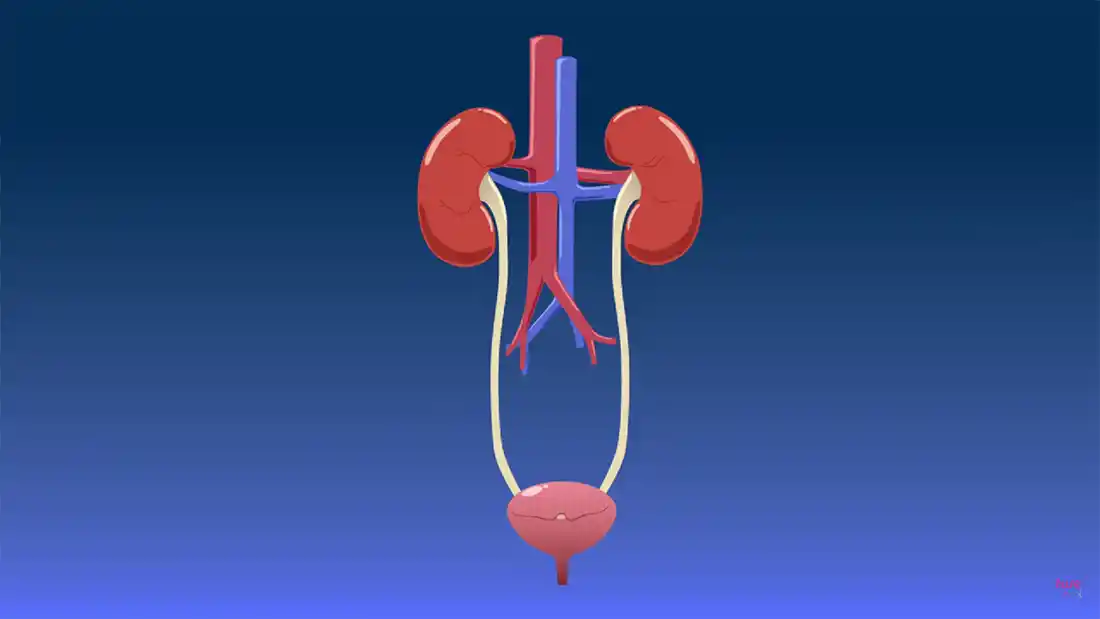

Kidneys, bladder, adrenal gland, urethra, urea, digestive system, urinary system, excretory system, anus, rectum.
The urinary (also called excretory) system allows us to remove waste product from our body.
The following organs help to deal with waste removal from our body:
If you have come from the bottom of the digestive system page, then you will already know that the rectum and anus play a part in removal of solid waste product our body creates from food. So, this section will concentrate on the urinary system.
The following still is from a video on the urinary system, with the following details:
Please click on the image to view the video.

The kidneys (plural, as there are two of them) are a non-stop urine-making machine. They are two bean-shaped organs that process urine from the blood that passes through them, which is then stored in the bladder before being released when you go to the toilet.
Healthy kidneys will process about half a cup of blood and remove waste and water from the bloodstream and digestive system to make urine. Processing this blood also creates urea, a waste product formed from the liver during the breakdown of proteins. It can be tested either by a blood sample or urine sample.
When your kidneys stop working, they will need help. In order for them to function properly again, they may need replacing. If so, you will be put on dialysis. This is a process that involves a chamber that works like your kidneys do to remove the waste material from the bloodstream. It is external to you, so you can see the process happening. There are two main types of dialysis - hemodialysis, and peritoneal.
The bladder is a smaller pouch-like organ that stores urine when it has been processed by the kidneys. It can hold up to 600ml in an adult's body, and then it will need dispensing of. Because it receives urine from two kidneys, there are two pipes called ureters that link up to the top of the bladder, one from each kidney.
Basically a large empty muscle, the bladder is fitted with two sphincters that act like a valve to allow urine to pass through when needed. Because it is a muscle, it will expand and contract when needed, storing fluid, or expelling it when you go to the toilet.

You can live quite happily with just one kidney working. If one is removed, your other kidney will boost its workload. This is also the same for lungs.
Located atop each kidney, these glands are triangular in shape, and produce hormones that control your metabolism, immune system and give a response to stress. They each have a cortex and a medulla (similar to the components in the brain).
If there are not enough hormones created by the adrenal glands, there can become a deficiency in adrenals, and this condition is called Addison's disease. This is one of the main reasons why we should be drinking enough water each day - 8 glasses a day!
OK, so it's not the singer. The urethra (in both male and female organ systems) allow us to excrete the urine from our bodies. For males, it is through the penis, and for females it is situated above the vaginal passage.
A woman's urethra is short - about 1.5 inches (3.8cm) long - whereas a man's is around 7-8 inches (17-20cm) long. This is because a man's urethra travels along the entire shaft of the penis.
A man's urethra has a separate function in that it allows transport of semen from the testicles during climatic sex. There is a common myth that there is also urine in this action, but it is just a coincidence that as well as the sperm from the testes, it includes a variety of proteins and minerals from other glands along with water to make the spermitic fluid.
Of course, with most of our organs, we are susceptible to infection. A typical water infection is the result of an infection in the urinary tract. It is also known as cystitis. The best advice to someone who suffers from regular bladder/UTIs is to drink plenty of water, making sure you go to the toilet more often if needed.
As with all infections, they can be treated. A simple water infection doesn't necessarily need treatment, but in worse cases, it can be treated with antibiotics.
If you are unable to see the board, please click here.
Here are a selection of links to items you could buy that would help teach some of the subject materials.
Disclaimer | About Me | Sitemap
Website design by SyntaxHTML.



Blue icons adapted from icons courtesy of Smashicons.com